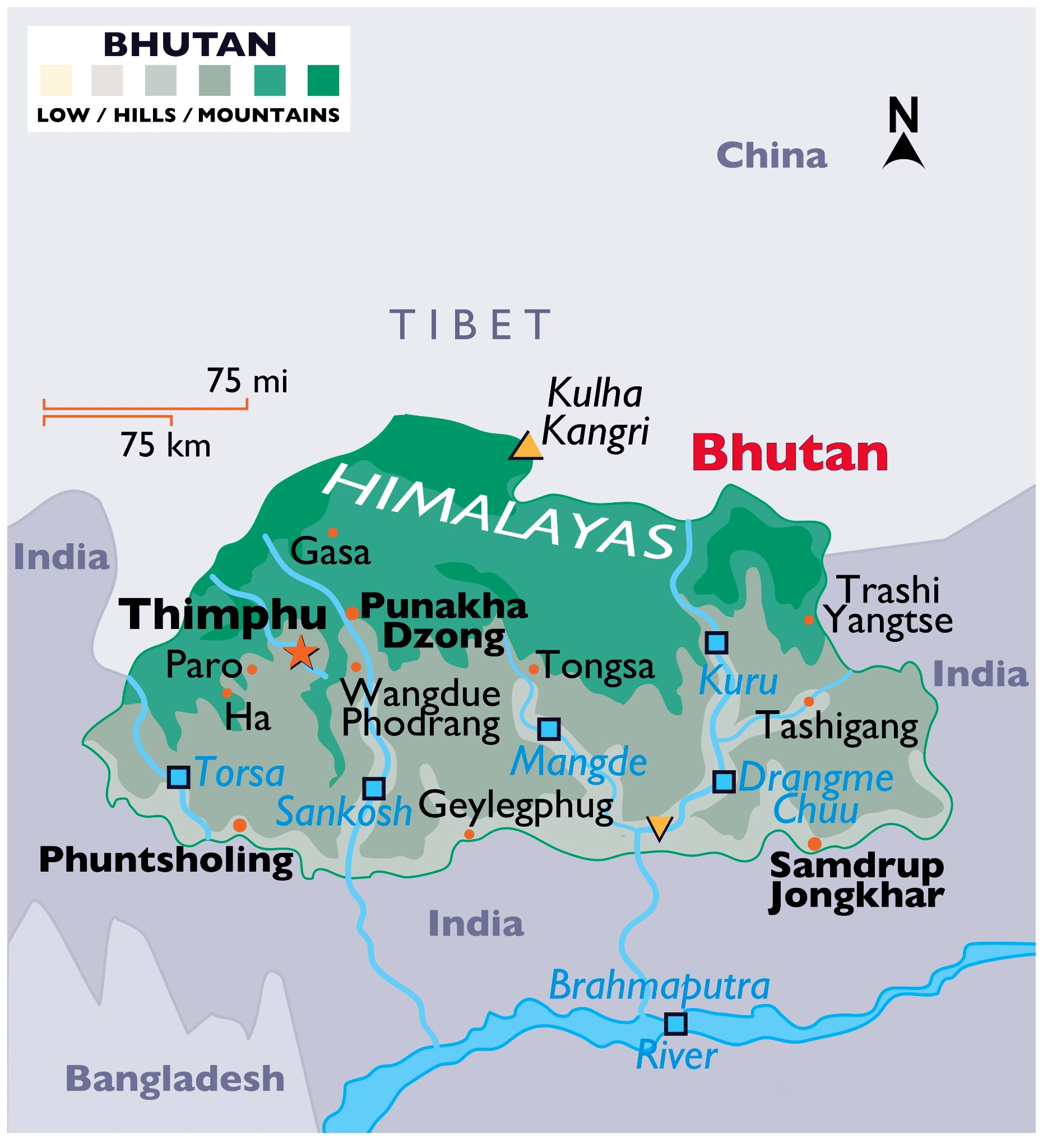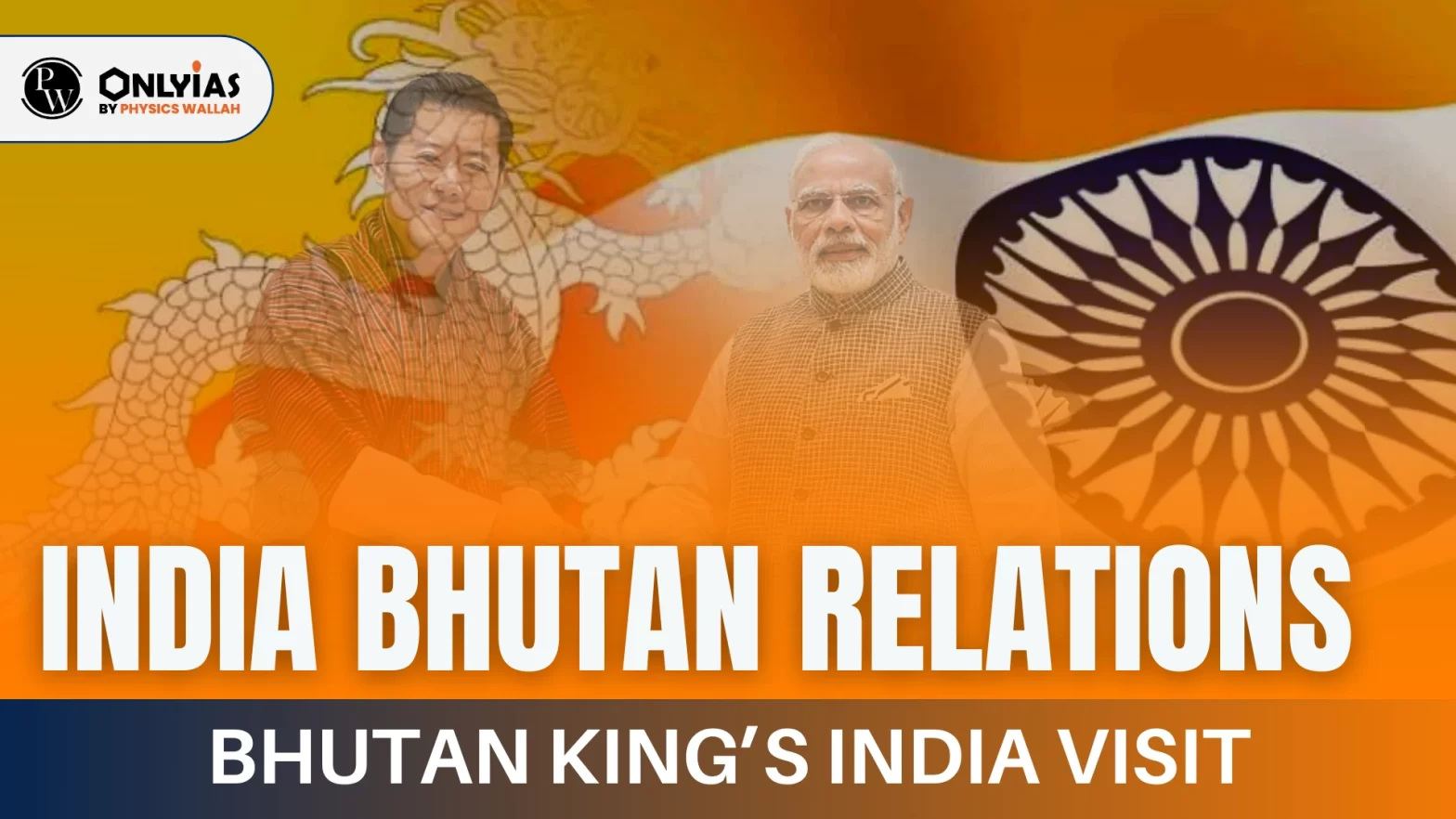Context:
- This article is based on an Editorial “India’s emerging challenge in Bhutan” which was published in the Business Standard. Bhutan King Jigme Khesar Namgyel Wangchuck will begin an eight-day visit to India, a trip that comes amid renewed push by Bhutan and China for an early settlement of their boundary dispute.
Background of India Bhutan Relations
- India and Bhutan share unique bilateral relations based on mutual trust, goodwill and understanding.
- Basic Framework: Treaty of Friendship and Cooperation signed in 1949 between the two countries, which was renewed in 2007 serves as the basic framework.
- Spiritual Kinship: Bhutan considers India as “gyagar,” the sacred land where Buddhism originated. Buddhism has kept the ties between the two countries resilient.
|
Significance of India Bhutan Relations
- High-level Exchanges:
- The 720 MW Mangdechhu Hydro Project
- The Ground Earth Station of ISRO for utilization of the South Asian Satellite
- Extension of interconnection between the National Knowledge Network of India and Bhutan’s Research and Education Network
- Trade and Economic Relations Between India and Bhutan: India is Bhutan’s top trade partner and India Bhutan Agreement on Trade, Commerce and Transit establishes a free trade regime and also provides for duty free transit of Bhutanese exports to third countries.
- Hydropower Cooperation between India and Bhutan: Mutually beneficial hydro-power cooperation is covered under the 2006 bilateral agreement for cooperation and its Protocol signed in 2009.
- Security and Geostrategic Aspect: Bhutan acts as a buffer between India and China. It has cooperated with India and helped to remove militant groups like United Liberation Front of Asom (ULFA) and National Democratic Front of Bodoland (NDFB) from the Himalayan nation.
- Multilateral Cooperation: Both are members of various regional groupings, including SAARC (South Asian Association for Regional Cooperation) and BIMSTEC (Bay of Bengal Initiative for Multi-Sectoral Technical and Economic Cooperation).
- New Areas of Cooperation: Bilateral cooperation has moved into new and emerging areas with full interoperability of the flagship digital project RuPay, Bhutan became the second country to launch the BHIM app, etc.
What are the challenges between India Bhutan relations?
- Normalizing Bhutan and China Relations: In October 2023, during the 25th round of border negotiations both aimed at ending the decades-old territorial disputes.
- For China, diplomatic relations and dispute resolution with Bhutan is crucial for its status as an Asian power, and for improving its offensive position vis-a-vis India.

- Security Concerns: The China-Bhutan boundary talks are raising security concerns for India as they cover the trijunction near the crucial Siliguri Corridor that connects India’s North East with the rest of the country.
- Bhutan may Join Belt and Road Initiative (BRI): India’s reservations about the BRI and its impact on the region, particularly in terms of sovereignty and debt implications, could cause friction given Bhutan’s strategic location.
- Economic Diversification: China’s exports to Bhutan have increased from Rs 200 crore in 2020 to Rs 1,500 crore in 2022.
- The Bangladesh, Bhutan, India, Nepal (BBIN) Motor Vehicle Agreement: Bhutan withheld its ratification of the agreement, citing environmental concerns.
- BBIN is a sub-regional initiative to improve economic cooperation and connectivity while bypassing complex political issues of SAARC.
Way Forward for the India Bhutan Relations
- India’s Diplomatic Balancing: India needs to maintain a strategic silence, indicating it does not anticipate these developments to harm its interest.
- Maintain Trust and Goodwill: India and Bhutan are based on mutual trust, goodwill and understanding, favoring India over China.
- Improving Security Cooperation: India’s deployment of the Military Training Team (IMTRAT) in Bhutan has been crucial for training Bhutanese security forces.
- Cultural and People-to-People Relations: Strengthening cultural ties through exchange programs, festivals, and educational initiatives can enhance people-to-people contact.
- Further Strengthening Economic Ties: India is the leading source of investments in Bhutan, comprising 50% of the country’s total Foreign Direct Investment (FDI) and needs to explore new sectors and products to diversify trade beyond the existing free trade agreement.
- India can invest in sectors like renewable energy, tourism, and technology while encouraging joint ventures and partnerships between Indian and Bhutanese companies.
Also Read: Warming Ties: On Bhutan China Relations and India’s Concerns
Conclusion:
As Bhutan’s King embarks on an eight-day visit to India amid evolving regional dynamics, sustaining and enhancing the multifaceted ties between the two nations becomes pivotal, necessitating diplomatic finesse, strengthened security cooperation, and continued economic diversification efforts.
![]() 4 Nov 2023
4 Nov 2023


